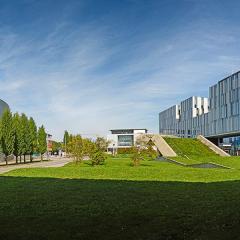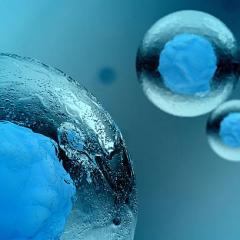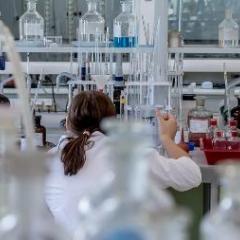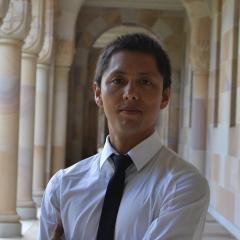Partnering for change
UQ's world-recognised research strengths in mining and engineering are valuable to Chile, where copper export alone stands for more than one third of government income. In fact, the country’s major copper mining companies – including Codelco – are currently partnering on a range of projects led by UQ chemical engineers.
Fast facts
47
Chilean students enrolled at UQ
129
Chile-UQ co-publications
16
academic staff born in Chile
2
research project collaboration
413
alumni in Chile
9
agreements with 7 official partners
Fast facts show full year 2023 data.
Research
Co-publications
Chile and UQ have partnered on 526 co-publications in the past 5 years, with key research areas including Astronomy & Astrophysics, Biochemistry & Molecular Biology, and Environmental Sciences. UQ's top co-publishing partners are the Pontificia Universidad Católica de Chile, Universidad de Concepción, and Universidad de Chile.
Research collaborations
In the past 5 years, UQ has collaborated with Universidad de Concepción, Pontificia Universidad Católica de Chile, and Altonorte on 3 research projects.
Research funding
Chilean organisations, including SMI International Centre of Excellence in Chile, National Copper Corporation of Chile, and Complejo Metalurgico Altonorte have contributed A$1,883,529 towards 14 research projects in the past 5 years.
Collaboration in action
Partnering with industry to tackle water-supply concerns
The Sustainable Minerals Institute’s International Centre of Excellence in Chile (SMI-ICE-Chile) has partnered with Mitsubishi Corporation subsidiary M.C. Inversiones Limitada (MCI) to provide Chilean industries and society with sustainable water supply system planning tools. The smart tools will assist in designing optimised water supply systems that minimise economic costs and environmental impacts by taking into account local contexts and conditions. Water consumption across most sectors in Chile is increasing and availability is declining, causing concerns for continued industrial productivity, ecosystem health and society in general. SMI-ICE-Chile researchers lead the 3-year project, working in close collaboration with MCI, colleagues at UQ’s Sustainable Minerals Institute and local partners in Chile.
Advancing the desalination supply system in Chile
An agreement between Sustainable Minerals Institute Centre of Excellence in Chile (SMI-ICE-Chile) and TRENDS Industrial paves the way for collaboration on an integrated multi-user desalination supply system in Chile’s Atacama region. TRENDS Industrial is the company behind the Energías y Aguas del Pacífico project a solar-powered desalination project in the Atacama Region, which aims to ensure the stability of the industrial water supply. Chile and the Atacama Region is in severe drought, and continued industrial development, especially by the mining industry, will depend on sustainable water supply. SMI-ICE-Chile’s Executive Director Professor David Mulligan said, “The mining industry is responding and seeking to adopt and implement the outcomes of such initiatives.”
Renewable energy developments threaten biodiverse areas
More than 2000 renewable energy facilities are built in areas of environmental significance and threaten the natural habitats of plant and animal species across the globe. A UQ research team and School of Earth and Environmental Sciences lead author Mr José Rehbein mapped the location of solar, wind and hydropower facilities in wilderness, protected areas and key biodiversity areas. Mr Rehbein said he was alarmed by the findings. The team urge governments, industry and development organisations to avoid expanding renewable energy facilities into conservation areas and plan for alternative locations. Chile was one of the key countries studied by the team. Mr Rehbein now works for The World Bank as an ocean and climate change consultant.
Changing the lives of children and families
The UQ-developed Triple P – Positive Parenting Program is offered free of charge to families in several Chilean municipalities to prevent child maltreatment (funded by the Ministry of Social Development) and to help prevent teen antisocial behaviour (funded by the Ministry of Home Affairs). Staff from these municipalities have been trained to offer a range of Triple P seminars as well as one-on-one and group interventions through schools, community centres and healthcare providers.
Student mobility
Masters of Business articulation
High achieving students from the University of Chile have the opportunity to articulate into the UQ Master of Business thanks to a long-standing double degree arrangement with the Faculty of Business, Economics and Law (BEL). Students undertaking the UChile Master of Global Management can undertake a study abroad year or a Master degree, following the first part of their studies in Santiago. Students complete the UQ Master of Business in seven months by following an accelerated study plan.
Hands-on experience for engineering students
The Faculty of Engineering, Architecture, and Information Technology facilitates field trips to Chile, giving chemical and metallurgical engineering students exposure to some of the world's largest minerals processing operations. In partnership with the Catholic University of the North, in Antofagasta, the students are given the opportunity to visit mine sites, and meet industry representatives from a range of companies, including Complejo Metalúrgico Altonorte, Codelco, BHP Billiton, and Anglo American.
Alumni
UQ has 400 alumni living in Chile. Alumni from or living in Chile include:
Related news
-
-
Seed funding awarded to nine global projects
26 August 2022 -
Ten international projects receive seed funding
1 November 2019 -
Strategic international initiatives receive seed grant funding
30 October 2018 -
International research collaboration secures funding
26 September 2017









